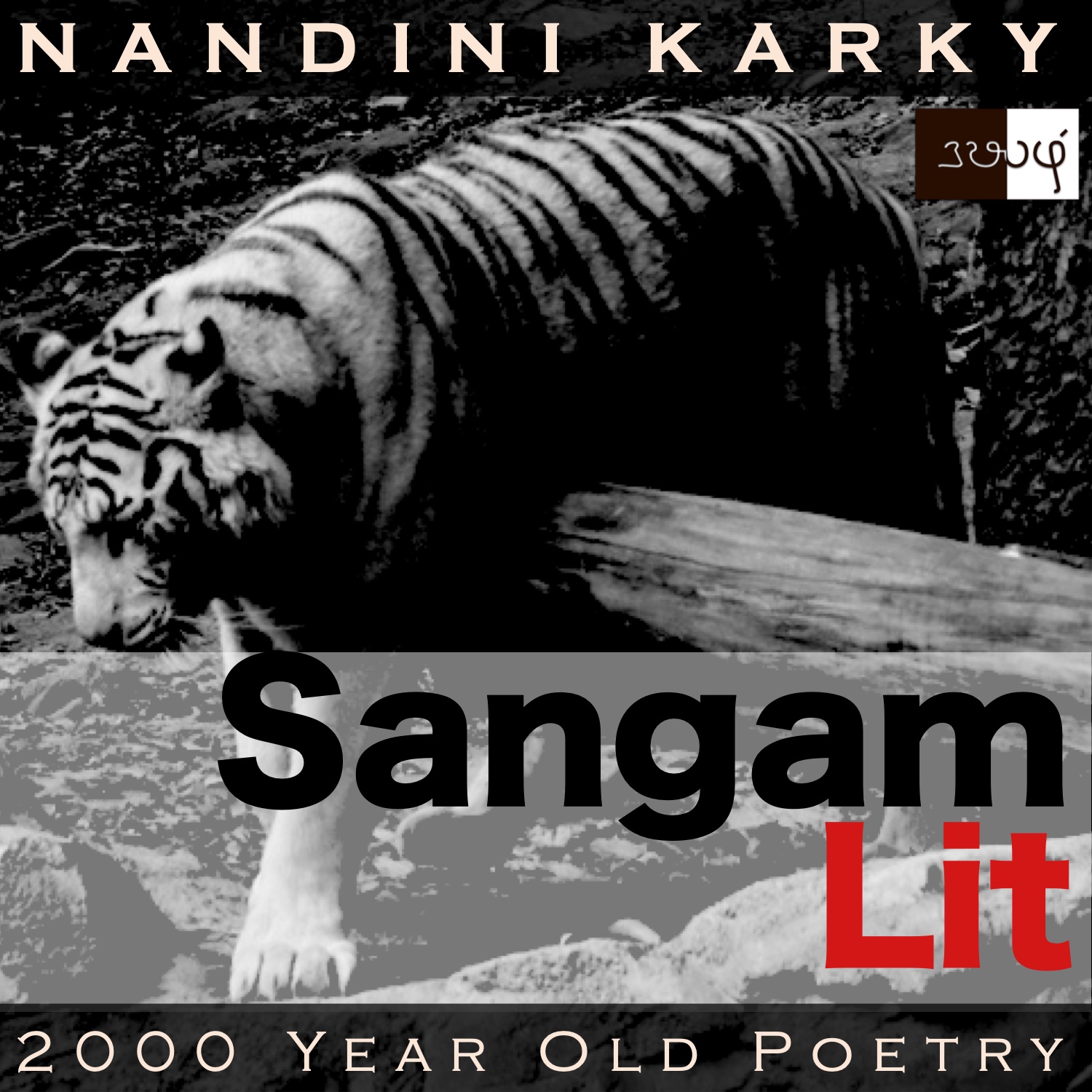Podcast: Play in new window | Download
Subscribe: Apple Podcasts | Spotify | Amazon Music | Android | iHeartRadio | Email | TuneIn | RSS | More

In this episode, we perceive the subtle ways of communicating intention, as portrayed in Sangam literary work, Natrinai 158, penned by Vellaikkudi Naakanaar. Set in the ‘Kurinji’ landscape of mountain country, the verse speaks in the voice of the confidante to the lady, passing on a hidden message to the man listening nearby.
அம்ம வாழி, தோழி! நம்வயின்,
யானோ காணேன்-அதுதான் கரந்தே,
கல் அதர் மன்னும் கால் கொல்லும்மே;
கனை இருள் மன்னும் கண் கொல்லும்மே-
விடர் முகைச் செறிந்த வெஞ் சின இரும் புலி
புகர் முக வேழம் புலம்பத் தாக்கி,
குருதி பருகிய கொழுங் கவுட் கய வாய்
வேங்கை முதலொடு துடைக்கும்
ஓங்கு மலை நாடன் வரூஉம் ஆறே.
This little poem beckons us to pay attention with the words ‘அம்ம’ meaning ‘listen closely’. ‘கல் அதர்’ talks about a ‘stone-filled path’ and ‘கால் கொல்லும்மே’, in rhythmic fashion, describes how that path ‘ruins the feet’. In a parallel structure, ‘கனை இருள்’ talks about ‘pitch darkness’ and describes how that darkness ‘ruins the eyes’. We glimpse at ‘வெஞ் சின இரும் புலி’ meaning ‘fury-filled, great tiger’ and in close proximity, a ‘புகர் முக வேழம்’ meaning ‘spotted-faced elephant’. Not a peaceful combination, for sure! Indeed, says the succeeding words ‘குருதி பருகிய’ meaning ‘drunk with blood’, painting a frightening scene in that mountain jungle. ‘வேங்கை முதலொடு’ flashes forth ‘the trunk of an Indian Kino tree’. Let’s understand the story woven from these intense images.
The man and lady have been in a love relationship for a while and the man has been meeting up with the lady through his nightly trysts. Perceiving that he’s keen only on his trysts, the confidante decides to convey a message to him. One night, when he arrives by the house, pretending not to see him, making sure he’s in earshot, the confidante says to the lady, “Listen, my friend. May you live long! I have never seen it. But, on its own accord, it appears before me. I refer to the path filled with stones many that destroys the feet and surrounded by darkness deep that destroys the eyes. This is the very path, which the lord of the high mountains treads on to come meet with you, where a furious, huge tiger, which lives in the caves within the mountain clefts, after attacking an elephant with a spotted face, drinks its blood and then, removes the stains on its plump cheeks and huge mouth, on the trunk of a ‘vengai’ tree!” With these words, the confidante details the dangers in the man’s path and in an intricate message, urges the man to seek the lady’s hand in marriage.
Now, to fly to the core of this subtle message. The confidante first talks about how she has never seen the path the man walks on and yet, she relates with shock, about the way the path appears crystal clear before her. She says she can feel the harshness of the stones in that path and they near ruin her feet with a stirring pain and adds, that surrounding this difficult path, is also an intense darkness that clouds around, making it impossible to watch the step. Having said that, she then turns her attention to a scene in the mountain path. Here, a furious tiger is in conflict with an elephant and making that gentle giant suffer, it drinks the elephant’s blood. After this frightening attack, the tiger walks towards a ‘vengai’, and rubs its blood-stained cheeks and mouth on that tree’s trunk. The confidante finishes by saying this is the mountain path that the man walks every night to come meet with the lady!
At first glance, all we can perceive is an interaction of wildlife in the forest. How does the confidante hide a message for the man’s heart? She does this by employing the poetic device of a metaphor. Like the tiger, which wipes away the stains on its face on the tree’s trunk, the man too must wipe away the stain on the suffering lady’s character, caused by slander in the village, by seeking the blessing of elders in the family. Using that graphic image, the confidante outlines the plan of action that the man must pursue to alleviate the lady’s suffering and bring lasting happiness. Another fascinating aspect of the poem that I wish to dwell on, is the power of the mind’s eye revealed in this age-old verse. The way to see something is not just through the eyes. Here, although she has never even seen that path, the confidante can see it in her mind’s eye, as if it were real. This path that she has never walked on, can make her feet suffer. Such is the power of the mind that hold the entire universe within. Although in this poem, the confidante uses this quality of the mind to evoke a sense of fear, I’m reminded of a contrasting quote by Helen Keller on the same lines. A different kind of testimony to her words that say “The best and most beautiful things in the world cannot be seen or even touched – they must be felt with the heart.”




Share your thoughts...